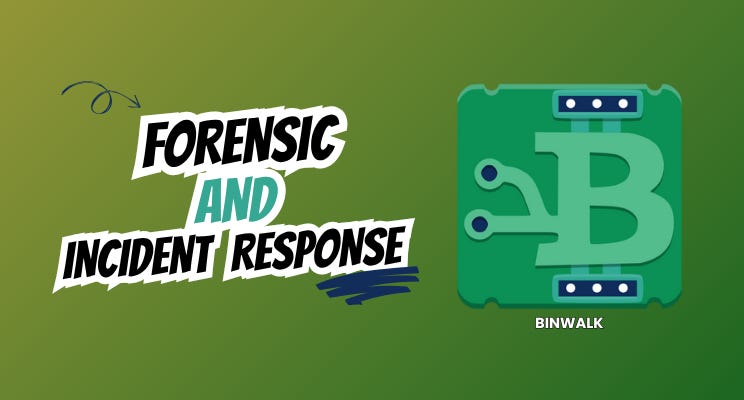Binwalk
A practical guide to the open-source tool for firmware analysis and reverse engineering in digital forensics and incident response.
Binwalk is a specialized open-source tool designed for analyzing, reverse engineering, and extracting embedded firmware images. Used extensively in forensics, vulnerability research, and hardware hacking, Binwalk helps security professionals inspect binary files for signatures of compressed files, embedded filesystems, and executable code within firmware. Its lightweight design and powerful extraction capabilities make it an essential utility in embedded system investigations and supply chain security assessments.
Whether you're dissecting IoT firmware, investigating a compromised device, or uncovering backdoors in smart gadgets, Binwalk equips you with the tools to dig deep into binary data.
First time seeing this?
What Binwalk Does
Binwalk scans binary files, typically firmware images or unknown blobs—to detect and extract file signatures, compression formats, and embedded filesystems like SquashFS, JFFS2, UBI, or FAT. It uses signature matching and entropy analysis to pinpoint where data begins and ends, allowing analysts to carve out and examine each component.
The tool supports both automatic and manual modes of analysis and can be extended via plugins or integrated into larger firmware analysis pipelines.
Key Features of Binwalk
Firmware Signature Scanning
Identifies known compression formats, filesystem types, and embedded binaries using a comprehensive signature database.
Recursive Extraction
Automatically extracts nested filesystems, archives, and binaries for deep inspection.
Entropy Analysis
Detects regions of high or low entropy to identify packed, encrypted, or uninitialized sections within the firmware.
Plugin Support
Extend Binwalk’s functionality with custom plugins for decryption, unpacking, or integration with disassemblers and emulators.
Integration with External Tools
Works seamlessly with tools like dd, gzip, binwalk-extract, QEMU, and firmware emulators for advanced analysis.
Command-Line Interface
Fast and flexible CLI for automation, scripting, or use in batch analysis of multiple firmware images.
Advanced Use Cases
IoT and Embedded Device Analysis
Reverse engineer firmware from routers, cameras, industrial controllers, and consumer electronics.
Malware and Backdoor Investigation
Identify hidden processes, hardcoded credentials, or command-and-control logic embedded in firmware.
Incident Response
Analyze suspicious firmware images from compromised devices during post-breach investigations.
Supply Chain Auditing
Verify firmware integrity and inspect vendor-supplied binaries for undocumented behavior or security flaws.
Security Research and Bug Hunting
Used by vulnerability researchers and bug bounty hunters to find 0-day exploits in embedded code.
Latest Updates
Recent improvements to Binwalk and its ecosystem include:
Enhanced signature database with more compressed and encrypted file format detections
Updated extraction scripts with better filesystem unpacking (especially for SquashFS variants)
Improved compatibility with newer Python versions and dependencies
Ongoing development via forks like Binwalk-ng and binwalk-extractor
Community plugin additions for firmware unpacking, binary diffing, and disassembly integration
Why It Matters
With the explosion of connected devices and embedded systems, firmware is now a critical attack vector. Binwalk empowers analysts to inspect what’s under the hood, uncovering vulnerabilities, misconfigurations, and malicious code that often go unnoticed. Whether for proactive security auditing or reactive forensics, Binwalk is a trusted tool for extracting insight from binary chaos.
Requirements and Platform Support
Binwalk runs on:
Linux (recommended: Kali, Ubuntu, Arch, etc.)
macOS (with dependencies)
Windows (via WSL or custom builds)
It requires:
Python 3.x
Dependencies like
matplotlib,scapy,pyqtgraph, and compression libraries (gzip,lzma, etc.)Firmware image files or raw binary blobs for analysis
Binwalk is open-source and available at https://github.com/ReFirmLabs/binwalk, with community documentation, plugins, and active development from embedded security researchers.








